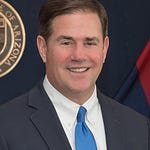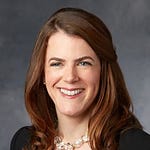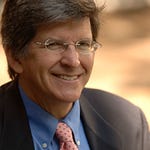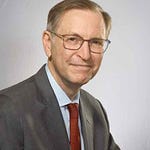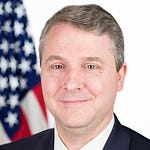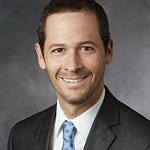It's been over 40 years since Milton Friedman's famous ten-part television series 'Free To Choose' was broadcast on PBS. Rob Chatfield, President and CEO of the Free To Choose Network (FTCN), speaks to us about the legacy of the original series as well as the variety of new FTCN media programs that continue to promote the ideas of Milton Friedman.
Jon: “It's a pleasure to welcome you to the 21st Century Podcast, where we talk about the economy, markets, and health policy. I’m your host, Jon Hartley. It's February 2020, and it's exactly 40 years since the popular Free To Choose PDF series was originally aired on PDF. I'm joined by my first guest, Rob Chatfield, president and CEO of the Free To Choose Network, the nonprofit that was originally responsible for the series. Rob, tell us a bit about yourself and the history behind the Free To Choose Network.
Rob: “First, John, thanks so much for having me here, and great to see you again. About two and a half years ago, I took over as president of the Free To Choose Network from a guy named Bob Chitester. And Bob Chitester was actually the original creator and producer of the Free To Choose series. And a funny little side note was I saw an advertisement on LinkedIn for the job position. I thought, Free To Choose? It's got to be Milton Friedman. What else could it be? And sure enough, I think that's why I got the job. It's because I was the only guy who had actually done the reading beforehand to know who Milton Friedman was. Shockingly enough, I think most people that are listening to your podcast, especially are going to be big fans of Milton Friedman, and would be surprised to know that there's still a lot of younger people out there who think Milton Friedman is one of their top influencers. In terms of the company itself, the nonprofit actually started about five years after Free To Choose. So the film itself was produced for PBS. And then afterward, Bob Chidester had done some other work before actually launching what is now the Free To Choose Network as an official nonprofit organization. It's really dedicated to doing those three things that Milton Friedman really espoused, which was individual freedom, economic freedom, and political freedom. And Milton was keen to point out that you didn't need to have all three of these in order for a society to thrive. It wasn't enough to just have economic freedom, for example. We see that a lot in the world today where people have economic freedom, but they don't have any personal freedom. The same thing, you could have somebody who said, there's a great degree of political freedom in certain places, but they have no ability to choose what they're living with. So I think that those three concepts are what Bob was really looking for on the standard bearer today. Thank you.”
Jon: “That's wonderful. What's incredible too, I think, about the Free To Choose Network, is that it's still producing PDF series. Can you talk to us a little bit about some of the more recent series that you've worked on and those that are actually being broadcast today that our listeners could potentially tune into?”
Rob: Well, the biggest one that's out right now is a three-hour series on PBS called A More or Less Perfect Union, and this features host Judge Douglas Ginsberg from the Eastern Circuit Court. And this one really is about personal and political freedom, along with economic freedom. People don't realize the reason we've got a country called the United States was because people couldn't trade back and forth. There was no interstate commerce. Everything was just a hodgepodge network of you didn't know what was going to happen from state to state. And so commerce was actually the beginnings of the U.S. Constitution. Prior to that, we had a film that we released called Sweden Lessons for America. In the Sweden film, people would be surprised to learn that Sweden is not in socialist paradise, much to the chagrin of some of the current candidates out there who have this cognitive concept called democratic socialism. Well, what does that really mean? And they like to say they're fond of saying, well, we don't mean that old-fashioned socialism. This is the newer socialism. But, Sweden and the Nordic countries are what they usually hold up as the model for this. And in our film, we showed exactly how it happens. Sweden is a capitalist, free-trading country that just so happens to have a very high tax system for its poor and middle class. So the poor and middle class support the poor and middle class welfare system.”
Jon: “I guess the idea being that there is a key distinction between what is traditionally known as a socialist country, by definition, one that controls the means of production, and that perhaps a country like the current Spanish-speaking state or the state of North Korea, that that is a very stark contrast to a state like Sweden that just has a much larger tax and transfer kind of system. I'm curious about getting back to Milton Friedman here. Why do you think Milton Friedman was such a great communicator of ideas? I think we have a lot of really brilliant academics out there today. But I think that there are very few who are able to capture the public imagination and influence policymakers in the same way that Milton Friedman did. I'm curious what makes him special as a communicator. Maybe this was being an economist first. But I'm curious, as far as your interest in becoming the CEO and president of the Jewish Network, what was it about Milton Friedman that first captivated you?”
Rob: “For myself, and you had two different questions in there, too. For myself, I'm a finance guy. And so I actually feel Milton Friedman from the monetary history of the United States. So that would be my first exposure to Milton Friedman. And then I got to learn more about him as I studied finance and economics in my younger years. But why was Milton such a great communicator? I think it's a whole different question. Because for me, I actually didn't watch television. So I never saw Milton Friedman the communicator. I'd only read Milton Friedman the author. I've subsequently learned, though, that Milton Friedman would tell you that it all goes back to when he was with the National Resources Committee. And he got into a discussion one time with a woman named Kate Williams. And Milton clearly said he lost his temper and he accused her of essentially doing something wrong, not having her back straight, whatever it was. The next day, Milton realized that it was, in fact, he that was wrong. And he made a point that he was going to change his behavior in terms of how he interacted with people from that day on. And it was probably the real component that made him such a compelling speaker. When you see him on film especially, this guy's always got a smile on his face. He always seems to be happy when someone's debating him. He doesn't tell a person, that's a stupid question. He might help the person rephrase the question. By giving him an answer that says, well, this is a ridiculous answer to the question, but if you rephrase your question like this, now what would it be? So that was Milton's communication skill, was that concept that, unlike most economists of the time who were put-down artists, always wanted to see, could they put down the other economists? Could they get that upper hand? Milton was much more cognizant of the fact that he could make mistakes, and therefore he was always going to be more kind to the next person.”
Jon: “It's absolutely fascinating. I think it's unbelievable to me how I think many of Milton's most famous videos and public statements still tend to go viral today, and I think many would argue that a lot of those arguments are very timeless in many ways. I think everything from, say, universal basic income to crypto currency to taxation to monetary policy, these were all issues that Milton Friedman spoke about. He talked a lot about income inequality. He talked a lot about the role of government. He talked a lot about socialism. I think all these ideas that I think are now back in the news, whether it's occupational licensing or any of those topics, he spoke about and wrote about frequently. I'm curious, now that we're 40 years on from the 2 Series, is there anything in particular about the original series or about this anniversary that I think is important that you want to highlight?”
Rob: “It's giving a little bit, Jon, of what happened to get the series started in the first place, and I say this because most people don't know the history of Free to Choose and why it got started as a series, but at the time there was a 13-hour series on PBS called The Age of Uncertainty written and presented by John Kenneth Galbraith, and at the time the person in charge of the Corporation for Public Broadcasting, which is actually a presidential appointee, was a guy named Alan Wallace, and Alan Wallace is probably the least well-known of three famous Chicago economists, George Stigler and the other one being Milton Friedman, of course, and Alan at the time was at the University of Rochester in upstate New York about, oh, a couple hours away from this little town in Pennsylvania called Erie, Pennsylvania. And somebody suggested to Alan that maybe he learn about this guy who just founded this PBS station here in Pennsylvania. And that guy, of course, was Bob Chittister, as I said, the creator and original producer of this series.”
Jon: “And the predecessor is the president CEO as well.”
Rob: “And so, as I said, Alan's the one who made the introduction to Bob. Bob was the one who always knew with regards to the fact that you've got to be able to tell stories. And that's how the stories are going to be told or how the message is going to get across. So being a master storyteller, Milton, by the way, said, I'll do this, but only if there's no script. I'm just going to talk straight to the camera. That's going to be not so much improvised. There could be several takes, but it wasn't going to be Milton reading off a script. It was going to be boring. And the concept of Milton going around the world and going and filming these things here to show, you know, here's capitalism in action. Here's what freedom looks like in action and where things are wrong and where things could be improved, I think, is an important component of the show. And I bring all this up because the next most important part was, if you remember, the original series, there was 30 minutes of Milton going around the world doing stuff. And then the debates where they'd get people from all sides to discuss essentially the issue that was discussed within that program. And those debates were fiery. And we got, as I said, you get the guilt of teacher's union leader going up against Thomas Sowell talking about public education. To me, these are some of the more riveting moments with regards to this project. What people don't realize is the only reason those debates were included was because when PBS looked at the program, they said, what are you going to do for balance? And Bob responded, well, this program is a balance to the 13 hours you did on John Kenneth Galbraith. And they said, oh, no, that was even-handed. But this Milton Friedman stuff, this is too far out there. And I mention all of this here as back story because I think if you try to figure out why is this still relevant today, what's going on today, if you pull up those original episodes, they can be distilled down into essential truths that were as true 40 years ago as they are today. And if you go back and look at the debate scenes, we're still arguing about the same stuff they were arguing about 40 years ago. Many of the things that Milton had suggested that have been implemented have led to improvement.”
Jon: “It's really amazing. I remember just having rewatched some of the series recently. I remember some of the scenes with Milton Friedman in Hong Kong and other places around the world going into various factories and really, really compelling. And then, yeah, of course, the debates. And it's amazing to see people like Tom Sowell, who are obviously today very, very influential and very well-known today, how they, in many respects, got their careers in part started by that series, which started at the very beginning of the 1980s. You think about the decade of prosperity and the rise of Wall Street and thinking of the expansion of capital markets and really just unbelievable how everything behind Free to Choose was really set in motion even before that. And I think in many respects it had an enormous amount of influence during the 1980s. Well, thank you so much, Rob, for joining us and really a pleasure to have you on and to really celebrate 40 years since the original Free to Choose series. I should direct anyone that's interested to either Free to Choose or anyone that's interested in related ideas to the Free to Choose network. You can find them—not only can you find them online, but they have a fantastic podcast of their own. They also have several wonderful things like Milton Mondays and other series as well, like Johan Norberg's Dead Wrong as well, which you can listen in to. And they also have their own Instagram and presence on Facebook as well, and I highly recommend that you follow them there. Thank you so much again, Rob, for joining us. Again, this is The Capitalism and Freedom of the 21st Century podcast.







